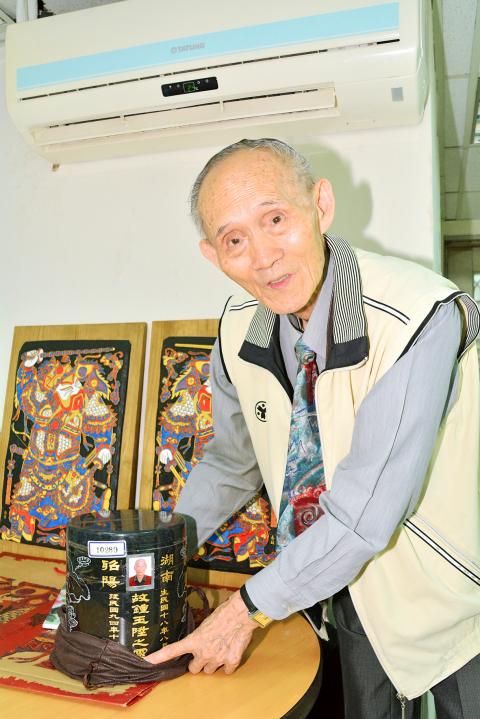An 81-year-old lawyer who came to Taiwan with the Chinese Nationalist Party (KMT) when he was 13 said in an interview with China’s CCTV that he is full of “bitterness” that his four grandchildren are all “little Taiwan independence [supporters].”
Kao Ping-han (高秉涵), who was born in China’s Shandong Province in 1935, took his family to China in July to “find their roots,” and during the trip he was followed by a group of Chinese reporters.
Kao is famous in China after he received the “Moving China” award in 2012 for his efforts in helping more than 100 veterans’ families take their loved ones’ ashes to China after they passed away in the past 20 years.

Photo: CNA
In the interview, Kao said he had taken his grandchildren to China so that they could learn more about Chinese culture, and visit the Yellow River and famous mountains “that are in their textbooks.”
“I want them to look at them for real. They think that those belong to China and have nothing to do with Taiwan,” Kao said.
When a journalist asked Kao’s 10-year-old grandchild: ‘Are you Chinese?’ she replied: ‘No, my grandpa is Chinese; I’m Taiwanese,’” Kao said.
“I’m full of bitterness,” Kao said.
The CCTV reporter said she could not understand how “that kind of situation emerged” among his grandchildren.
To the reporter’s puzzlement, Kao said it was due to “so-called Taiwanese cultural independence.”
“After [former president] Chiang Ching-kuo (蔣經國) died, [former president] Lee Teng-hui (李登輝) implemented ‘desinicization’ during his eight years of presidency, which was followed by [another eight years of former president] Chen Shui-bian (陳水扁). There had been nearly 20 years of ‘desinicization,’” Kao said.
“There is nothing I can do; those who voted for [President] Tsai Ing-wen (蔡英文) are exactly those ‘little Taiwan independence [supporters]’ who started [to form] 20 years ago,” Kao said.
“Taiwan itself has no culture, as it is part of the Zhonghua minzu [Chinese ethnic group, 中華民族]; its culture is China’s culture, but what the Democratic Progressive Party has taught them is to believe that Taiwan belongs to the Aborigines,” he said. “I asked one of my granddaughters which is the longest river in our country and she said it was the Tamsui River, when I expected her to say the Yangtze or the Yellow River, which she said are not Taiwanese rivers. They will not say Taiwan is a nation, a notion they have not yet acquired, but [they simply say] they are Taiwanese.”
“I’m doing my job as everybody has to when the nation is in trouble,” Kao said in response to reporters’ queries as to how he could change the trend by himself. “By bringing my grandchildren [to China] I want them to recognize their ancestors and remove from them this independence [thinking].”

Taiwanese can file complaints with the Tourism Administration to report travel agencies if their activities caused termination of a person’s citizenship, Mainland Affairs Council Minister Chiu Chui-cheng (邱垂正) said yesterday, after a podcaster highlighted a case in which a person’s citizenship was canceled for receiving a single-use Chinese passport to enter Russia. The council is aware of incidents in which people who signed up through Chinese travel agencies for tours of Russia were told they could obtain Russian visas and fast-track border clearance, Chiu told reporters on the sidelines of an event in Taipei. However, the travel agencies actually applied

Japanese footwear brand Onitsuka Tiger today issued a public apology and said it has suspended an employee amid allegations that the staff member discriminated against a Vietnamese customer at its Taipei 101 store. Posting on the social media platform Threads yesterday, a user said that an employee at the store said that “those shoes are very expensive” when her friend, who is a migrant worker from Vietnam, asked for assistance. The employee then ignored her until she asked again, to which she replied: "We don't have a size 37." The post had amassed nearly 26,000 likes and 916 comments as of this

New measures aimed at making Taiwan more attractive to foreign professionals came into effect this month, the National Development Council said yesterday. Among the changes, international students at Taiwanese universities would be able to work in Taiwan without a work permit in the two years after they graduate, explainer materials provided by the council said. In addition, foreign nationals who graduated from one of the world’s top 200 universities within the past five years can also apply for a two-year open work permit. Previously, those graduates would have needed to apply for a work permit using point-based criteria or have a Taiwanese company

The Shilin District Prosecutors’ Office yesterday indicted two Taiwanese and issued a wanted notice for Pete Liu (劉作虎), founder of Shenzhen-based smartphone manufacturer OnePlus Technology Co (萬普拉斯科技), for allegedly contravening the Act Governing Relations Between the People of the Taiwan Area and the Mainland Area (臺灣地區與大陸地區人民關係條例) by poaching 70 engineers in Taiwan. Liu allegedly traveled to Taiwan at the end of 2014 and met with a Taiwanese man surnamed Lin (林) to discuss establishing a mobile software research and development (R&D) team in Taiwan, prosecutors said. Without approval from the government, Lin, following Liu’s instructions, recruited more than 70 software